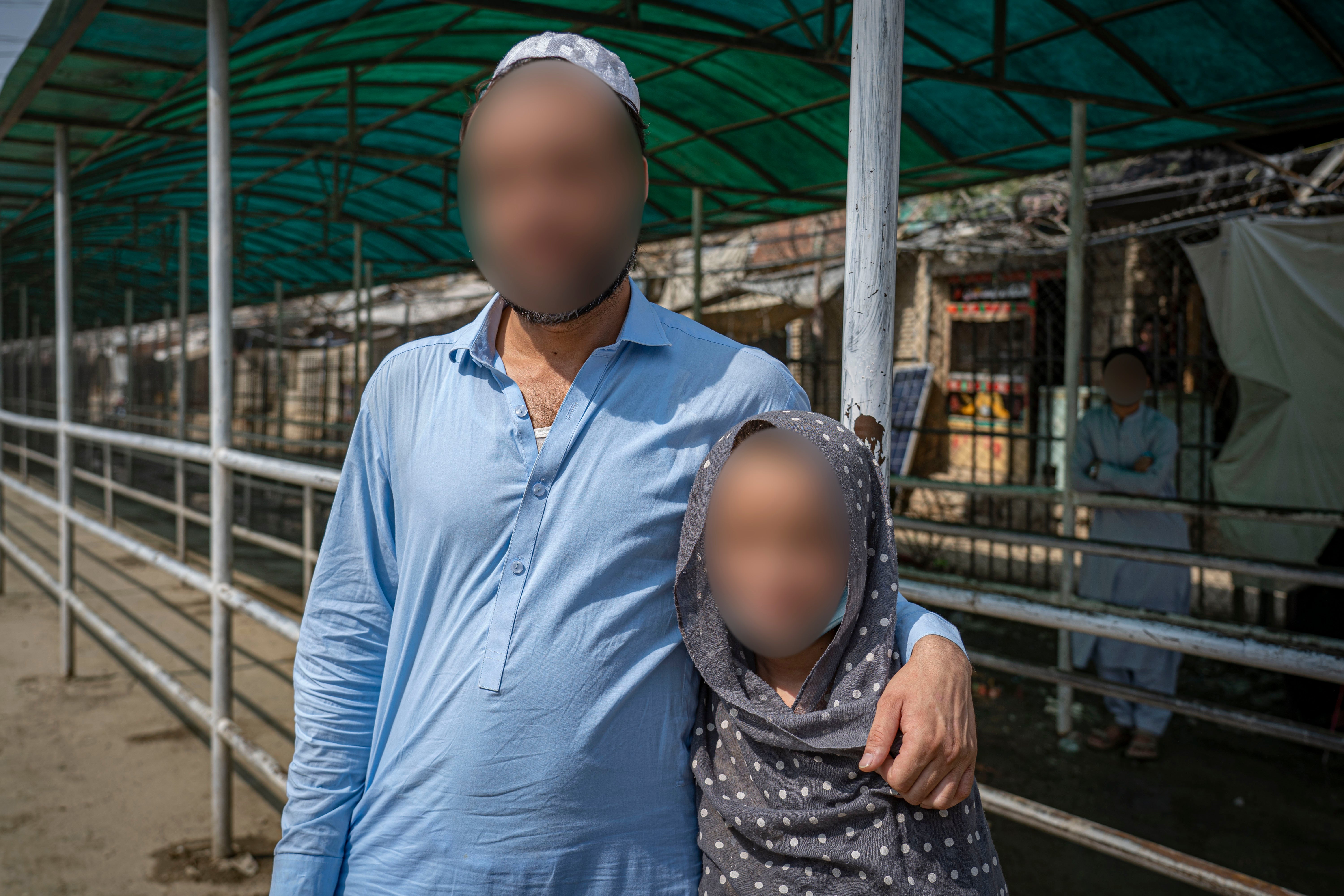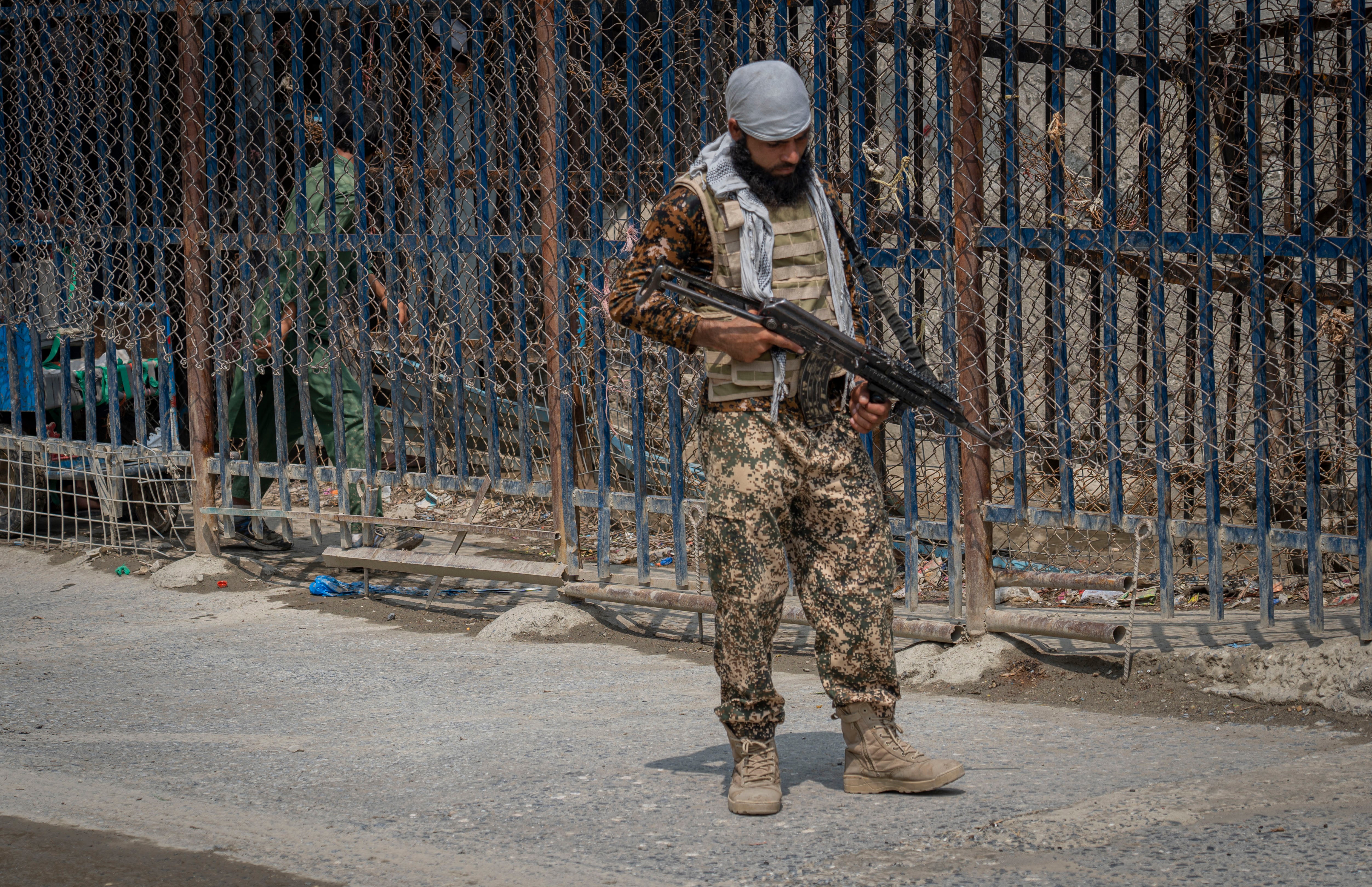‘They left me behind’: British taxi driver describes treacherous escape from Afghanistan to Pakistan
Imran escaped from Kabul through Jalalabad to Pakistan with his family navigating official and unofficial Taliban checkpoints, writes Bel Trew at the Torkham border


A few metres away from rifle-wielding Taliban fighters at the foot of the Khyber Pass, seemed like an unlikely location to discuss Wembley.
But Imran, a 37-year-old British taxi driver, had just escaped Afghanistan with his family and in that immediate rush of relief was excited about finally being able to return there.
The Londoner was one of the hundreds of British citizens who the government admitted to leaving behind in the humiliating exit from the war-ravaged country. He had been visiting his wife and three children in Kabul over the summer, and said he had his flight booked home for 18 August. That turned out to be just three days after the Taliban seized control of the capital.
After initially “sheltering in place” following the advice of the UK authorities amid bomb threats and then an Isis-K attack, which killed 169 people, Imran said he had tried unsuccessfully to leave the country via Kabul airport.
But he had all but lost hope of getting out when news broke that the last British soldiers and diplomats had left Afghan soil on 28 August.
“They left me behind, “ he said, somewhat dazed as he looked out over the Spin Ghar mountains in Pakistan stretching far into the horizon.
“We received emails telling us to come to the airport, so we tried but there was no one there.”
The children are looking forward to Wembley. We are so relieved to be out
“There were points where I was really scared. There was gunfire in Kabul that terrified the children.”
After the US completed their withdrawal a few days later, Imran said he kept a low profile in the capital amid reports the Taliban were targeting foreigners. He said he eventually managed to secure a transit visa from the Pakistan embassy in Kabul to get out overland, with help from the British High Commission in Islamabad.
Imran, who has lived in the UK for 20 years, had to keep his British passport under wraps as he and his family made the treacherous journey from Kabul through Jalalabad to the Torkham border with Pakistan, navigating official and unofficial Taliban checkpoints. Over the last week there have been several reports of men on the road specifically targeting and holding foreigners at gunpoint.
Carrying the birth certificates of his children, who are not British citizens, he said he and his family were excited to go to Wembley and start their new lives.
“[The withdrawal] was a horrible mess. But now I feel so lucky. I feel relief.”

Boris Johnson and Dominic Raab have come under blistering criticism over the chaotic exit from Afghanistan that left behind hundreds of British citizens as well as thousands of Afghans eligible for visas and resettlement.
Even Tory MPs have not minced their words calling it “a betrayal” and an “abandonment”.
At the time the prime minister said he felt a “great sense of regret” over those who had not made it on the evacuation flights and vowed to shift “heaven and earth” to help them out.
There was a small breakthrough on Thursday when 13 British nationals were among over 100 people, including American, Canadian and German citizens who flew from Kabul to Doha on the first international flight out of Kabul after western forces left.
The foreign secretary thanked Qatar adding that “we expect the Taliban to keep to their commitment to allow safe passage for those who want to leave”.
But Tobias Ellwood, a senior Tory MP and chair of the defence select committee, who has called for an investigation into the “colossal” number of mistakes made in the withdrawal, told The Independent there was still a long way to go.
Mr Ellwood “welcomed the good news” of Thursday’s flight to Qatar that meant there was a mechanism for British nationals to get out but said he feared for Afghans who were now being hunted by the Taliban for working with the UK, as the fighters had “databases” of information.
The Independent is in touch with at least one Afghan woman who said she had worked with the British embassy and fearing for her life is hiding in Kabul.
“The challenge will be at-risk Afghans, those who helped the British,” Mr Ellwood told The Independent, urging the government to use its leverage with NATO-ally Turkey and Qatar to allow the UK representation through their embassies that are still operating in Kabul.
That might mean visas could be processed, he explained.
It is unconscionable that Ministers had 18 months to plan for our withdrawal, but their failure to prepare has left many – at risk of Taliban reprisals
“Without any formal recognition [of the Taliban government] from a diplomatic or political context, we need some form of representation in Kabul. I would encourage the government to utilise our relationship with both Qatar and Turkey to make this happen.”
Lisa Nandy, shadow secretary of state for Foreign and Commonwealth Affairs, told The Independent that the UK government should be “moving heaven and earth” to ensure British nationals are brought home safely from Afghanistan.
“It is unconscionable that ministers had 18 months to plan for our withdrawal, but their failure to prepare has left many to whom we owe an obligation – including vulnerable Afghans who have served alongside us for two decades – at risk of Taliban reprisals,” she said.
“The prime minister and foreign secretary need to get a grip on the situation now. The priority must be to work with regional partners and the international community to ensure land borders remain open for those at risk of being targeted by the Taliban, allowing safe passage out of Afghanistan and upholding our commitments to those we have left behind.”

The Foreign, Commonwealth and Development Office (FCDO) told The Independent that the UK had evacuated more than 15,000 people, including over 8,300 British nationals from Kabul since mid-August, “in the biggest airlift from a single country in a generation.”
“The UK and international partners are all committed to ensuring that our citizens, nationals and residents, employees, Afghans who have worked with us and those who are at risk can continue to travel freely to destinations outside Afghanistan,” they said. “We have been clear that the Taliban must allow safe passage for those who want to leave.” The Prime Minister told parliament this week that the authorities were aware of 311 people who remain in Afghanistan who are eligible for refuge via the Afghan Relocations and Assistance Policy (ARAP) . Of them Mr Johnson said 192 were called forward for evacuation but did not make it in time before the final RAF flight departed.
But despite these assurances, those still stuck in Afghanistan have told The Independent their requests to apply for assistance have been ignored. One female journalist and translator who worked as a consultant for the British Embassy, as well as prominent western publications, putting her at risk, said her pleas for help have been met with a wall of silence.
“I’ve just been ignored,” she said, asking for her name to be withheld as she feared for her life.
“I don’t even know what to think anymore. I am desperate.”
Back at the Torkham border, on the Afghan side, crowds press against the border fences desperate to cross as armed Taliban fighters in military fatigues stand guard. So far the Pakistani authorities are not allowing entry to anyone without a Pakistani passport, valid visa or medical permit fearing a mass influx of refugees. It already hosts an estimated three million Afghan refugees from previous conflicts.
“There are a lot of people waiting to cross, “ said Imran, as he packed his family into a taxi, describing the chaotic scenes on the other side.
Next to him his daughter, exhausted and traumatised from her ordeal, began to smile as they chattered about their new life.
“The children are looking forward to Wembley. We are so relieved to be out.”
Sign The Independent’s petition urging the UK to take in more refugees from Afghanistan here.
Join our commenting forum
Join thought-provoking conversations, follow other Independent readers and see their replies
Comments
Bookmark popover
Removed from bookmarks